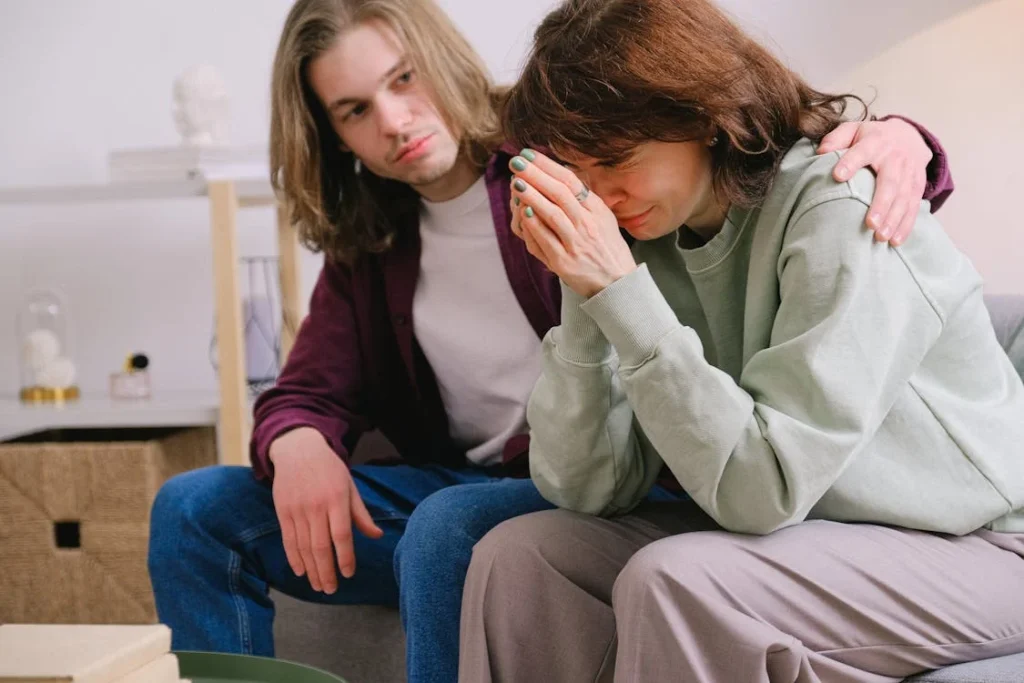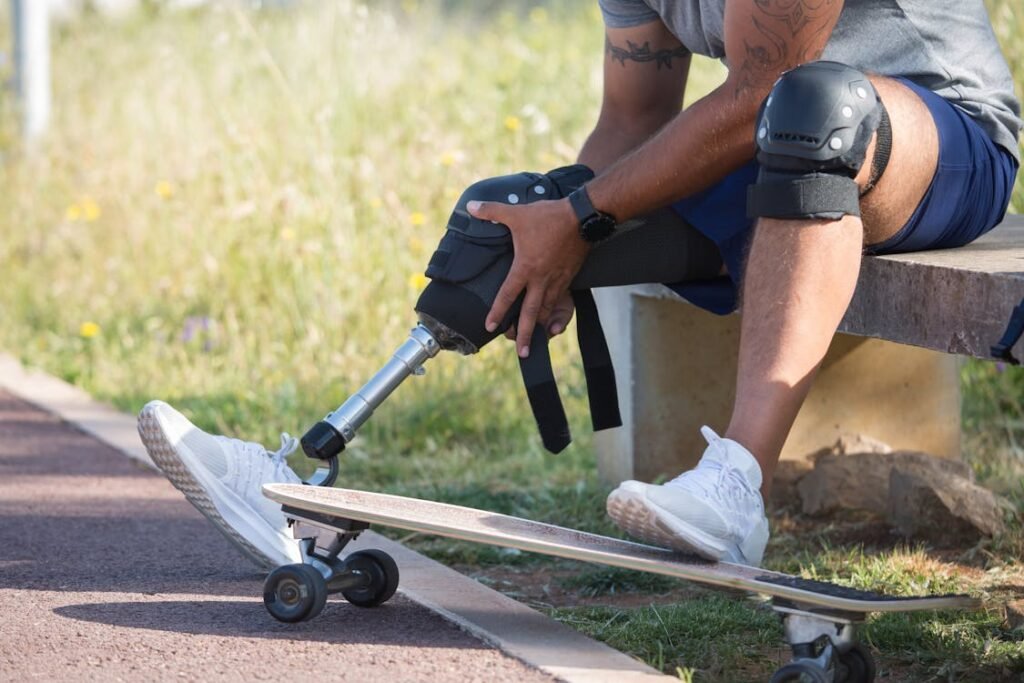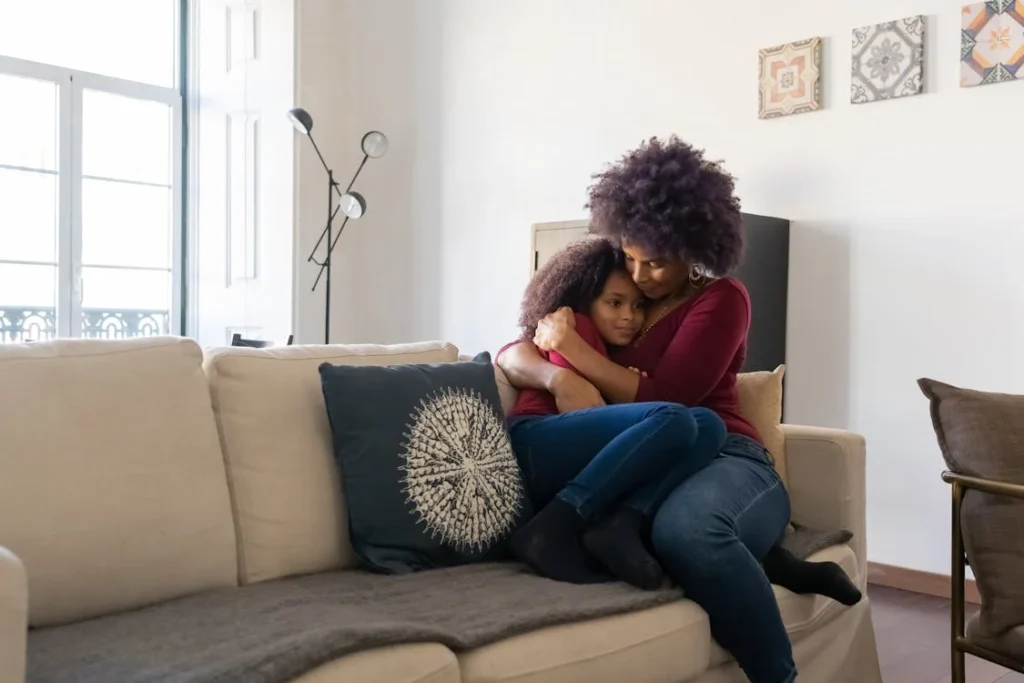Losing a limb is never just a physical experience. It touches every part of life—how a person sees themselves, how they connect with others, how they move through the world, and how they think and feel each day. For many amputees, the journey after surgery isn’t just about learning to walk with a prosthetic or adjusting to daily tasks. It’s also about facing waves of emotions, fears, frustrations, and a deep sense of loss that words often can’t fully describe.
At Robobionics, we’ve worked closely with thousands of amputees across India. And if there’s one truth we’ve learned over and over again, it’s this: healing doesn’t end with the body. The mind and heart need care too. That’s why mental health support—especially counseling—must be a part of every amputee’s recovery journey. And not just for the individual who experienced the amputation, but for their family too.
Families go through this journey in their own way. They carry stress, guilt, and helplessness. They often struggle silently while trying to stay strong for their loved one. But the truth is, they need support too. When the mind is cared for, everything else becomes easier—rehabilitation becomes more effective, relationships become stronger, and the person regains not just movement, but hope.

Understanding the Emotional Journey After Amputation
The Quiet Storm of Emotions
Right after an amputation, it’s common for people to focus on the physical challenges. Hospital visits, wound healing, fitting a prosthetic, learning to walk again—all of this takes up a lot of space.
But under the surface, a storm often brews quietly. Many amputees experience feelings of grief. This grief isn’t just for the limb that was lost, but for the version of life they once knew.
There can be a deep sadness that arrives unexpectedly. Some days feel heavy. Motivation can disappear. Things that once seemed simple—like going out in public or speaking with friends—can now feel overwhelming.
It’s not unusual for someone to feel anger or resentment, especially if the amputation was caused by an accident, illness, or medical error. Some feel shame about how they look.
Others feel they’ve become a burden to their family. These thoughts, left unspoken, can build up until they start affecting sleep, eating habits, social life, and even physical recovery.
This is why counseling is not just helpful—it’s necessary. Having someone to talk to, someone trained to listen and guide, can create space for those emotions to come out safely and gently.
When emotions are not pushed down or ignored, healing becomes smoother.
What Families Experience (But Don’t Always Share)
When a loved one loses a limb, family members go through a transformation of their own. Life changes in an instant. Routines shift.
Plans are put on hold. There’s often worry, confusion, and fear. How do we support them? Will they be okay? What if we say the wrong thing? These silent questions weigh heavily on the mind.
Some family members feel guilty—thinking they should’ve done more to prevent the situation. Others carry the stress of becoming a caregiver, adjusting to new responsibilities, all while trying to keep the home running.
Emotional exhaustion creeps in. But most of the time, families stay silent. They think their role is to be strong, to never complain, to keep going.
But they need support too. They need a place where their own feelings are seen and heard. That’s where family counseling becomes a powerful tool—not just for understanding the amputee better, but for understanding themselves.
Why Mental Health Often Gets Overlooked
In many parts of India—and in other countries too—mental health still carries a heavy stigma. People are taught to “be strong” and to avoid talking about feelings.
This attitude is even stronger when it comes to men, elders, or those in rural areas. So when an amputee begins to struggle emotionally, it’s easy for them to feel ashamed.
They might think asking for help means they are weak. Families might brush off signs of depression or anxiety, thinking it will pass with time.
But mental health is no different from physical health. If a person breaks a bone, they go to a doctor.
If their heart is hurting emotionally, they should be able to go to a counselor without fear. Breaking this mindset is one of the first steps to getting better.
At Robobionics, we encourage every patient and their family to think of counseling as a tool—not a sign of weakness.
Just like a prosthetic helps you move better, a counselor helps you think and feel better. The two work hand in hand.

Types of Mental Health Counseling That Help Amputees and Families
One-on-One Counseling for Amputees
Personal counseling gives amputees a space where they can speak openly without being judged. It allows them to talk about their fears, frustrations, and sadness in a safe and quiet setting.
A trained counselor listens carefully, not just to what’s being said, but also to what’s hidden between the lines.
Over time, these sessions can help an amputee see things more clearly, shift their perspective, and begin rebuilding confidence from the inside out.
Many amputees face what psychologists call “phantom limb pain,” where they feel sensations or even pain in the part of the body that is no longer there.
While this has a physical root, it is deeply connected to emotional health. A counselor can help with techniques that calm the mind and reduce the mental stress that often makes this pain worse.
Another common issue is body image. Amputees often feel uncomfortable in their own skin.
They may avoid mirrors, withdraw from social settings, or feel unlovable. In one-on-one counseling, they learn to reconnect with themselves, step by step.
They are guided toward accepting their new body, understanding that their worth has not changed, even if their appearance has.
Sometimes, the issue isn’t sadness or fear—it’s anger. Counseling provides tools to channel that anger in healthy ways. It helps amputees turn frustration into fuel, giving them mental strategies to stay motivated during hard days.
Counseling for Couples and Family Members
An amputation affects the rhythm of a household. Couples may feel the strain in their relationship, especially if roles suddenly shift.
A partner who was once a spouse now becomes a caregiver, which can blur boundaries and create distance.
Counseling gives couples a way to talk through these shifts, to express what they’re feeling, and to rebuild closeness without blame or guilt.
For children, watching a parent go through amputation can be confusing and scary. They might not have the words to express what they’re feeling.
Family counseling creates an open, honest environment where kids and adults can both learn how to talk, listen, and support one another.
It helps them understand what’s happening in age-appropriate ways, so they don’t carry silent worries.
In larger families, tensions can rise. Financial stress, caregiving duties, and emotional fatigue can cause arguments and emotional distance.
Family counseling helps members find balance, understand each other’s struggles, and move forward together as a team. It’s not about fixing everything at once—it’s about learning how to cope together.
Group Therapy With Other Amputees
There is something deeply healing about sitting in a room with people who understand exactly what you’re going through.
Group therapy brings together amputees who may be strangers, but share the same emotional wounds. In this space, they don’t need to explain what it feels like—they’re simply understood.
In group sessions, people share stories, offer advice, and give support. They talk about small victories—like walking for the first time with a prosthetic—or setbacks that others can relate to.
Hearing someone else say, “I’ve been through that too,” can lift a burden that no one else even knew was there.
It also builds a sense of community. Many amputees feel isolated, especially if they live in areas where they don’t know others in a similar situation.
Group therapy removes that loneliness. It creates a sense of belonging, which is a powerful tool for emotional recovery.
Group counseling doesn’t mean that everyone shares every time. Some just come to listen. And that’s okay. Sometimes, just hearing others talk is enough to feel less alone.

How to Access Mental Health Counseling in India
Finding the Right Support in Your Area
Finding counseling can feel overwhelming at first, especially if you’ve never done it before. But the truth is, help is more available now than it’s ever been.
In cities across India, there are trained mental health professionals who work with amputees and understand their unique challenges.
Hospitals and rehabilitation centers often have in-house counselors or can refer you to someone nearby.
At Robobionics, we often guide our patients toward counselors who specialize in trauma, grief, and disability adjustment.
These professionals are not just skilled in general psychology—they understand what it means to lose a limb and how it changes daily life.
This kind of specific experience matters. It means the person you’re talking to doesn’t just nod politely—they truly understand what you’re feeling.
If you live in a smaller town or rural area, you may not find many mental health professionals nearby. But that doesn’t mean you’re alone.
Many counselors now offer telehealth services, which means you can have a session from your home through your phone or laptop. This makes mental health care possible even in places where in-person options are limited.
What matters most is finding a counselor you feel safe with. You should never feel rushed, judged, or unheard.
If something doesn’t feel right in your first session, it’s okay to try someone else. Just like with a doctor, finding the right fit can take time—but it’s worth it.
What to Expect in Your First Counseling Session
The first counseling session is often the hardest to walk into. Many people don’t know what to expect. Will I have to share everything? What if I cry? What if I don’t know what to say? These worries are completely normal.
And here’s the truth: you don’t have to say anything you’re not ready to. The counselor will gently guide the conversation.
They might start by asking how you’ve been feeling lately, what brought you to the session, or what challenges you’re facing right now.
You don’t need to have the perfect words. You don’t need to tell your whole story. Just showing up is enough. Over time, as you feel more comfortable, you can open up more.
The space is yours to use however you need to—whether it’s talking, sitting in silence, or asking questions about how to handle your thoughts.
Counselors often use different methods based on what works best for you. Some may use talk therapy.
Others might use mindfulness, relaxation techniques, or guided imagery to help you manage stress and anxiety. Every session is shaped around what you need most at that time.
Costs and Accessibility
One concern many people have is about the cost of counseling. In private clinics, sessions can range anywhere from ₹500 to ₹2000 depending on the city and experience of the counselor.
For some families, this can feel like a heavy expense. But there are ways to reduce the cost.
Many NGOs and government hospitals offer free or low-cost mental health support. Organizations such as NIMHANS (National Institute of Mental Health and Neurosciences) in Bangalore, or TISS (Tata Institute of Social Sciences) in Mumbai, offer affordable services.
Some private counselors also offer sliding scale fees, which means they adjust their price based on your income.
Online platforms have made counseling more accessible too. Websites like YourDOST, Manastha, and iWill Therapy offer sessions in regional languages, with trained psychologists, at a lower cost than in-person therapy. Some even offer your first session for free.
Mental health care should never be seen as a luxury. It is a part of healing. And there are ways to access it, no matter your location or budget. The most important thing is to take the first step.

Building a Supportive Environment at Home
How Families Can Create Safe Emotional Spaces
Healing does not only happen in a clinic or therapy room. It also happens in the quiet corners of home—at the dinner table, during a walk, or even in the silence shared between loved ones.
For an amputee, coming home after surgery can feel like returning to a different world. The furniture feels unfamiliar.
Tasks that were once simple now seem distant. But more than anything, what truly changes is the emotional atmosphere.
Families can make a big difference in the mental health of an amputee by simply being present—not just physically, but emotionally. This doesn’t mean having all the answers.
In fact, most of the time, what helps the most is listening. Allowing your loved one to express their feelings without interrupting or trying to “fix” them makes them feel heard and valued.
There will be days when the amputee is frustrated, angry, or withdrawn. Instead of seeing this as rejection, family members can gently acknowledge their pain.
A simple phrase like, “I know this is hard for you. I’m here when you’re ready,” can offer comfort without pressure. The goal is to create a home where emotions are not ignored or silenced, but respected.
It’s also important to talk openly about the amputation. Avoiding the topic can make it seem like it’s something to be ashamed of. But when families speak about it normally, it helps the amputee accept it too.
Using kind, supportive language when referring to the limb loss or prosthetic helps reduce shame and builds a stronger sense of identity.
Rebuilding Routines With Care and Flexibility
When a person loses a limb, their daily routine is disrupted. Simple activities like getting dressed, cooking, or going outside might need to be adjusted.
Families often feel the pressure to make everything “normal” again quickly. But real healing takes time. Instead of rushing, focus on building a new routine slowly, with care and flexibility.
Encourage independence, but don’t force it. Let your loved one try things on their own, and step in only when asked or when truly needed.
This builds confidence. Celebrate small wins, like tying their own shoelaces or managing stairs with a prosthetic. These victories, while small on the surface, carry deep emotional meaning.
Flexibility is key. Some days will be easier than others. Plans may need to change depending on physical pain, mood, or energy.
Instead of getting frustrated, let the family routine breathe. Replace rigid schedules with gentle rhythms. This makes everyone feel more at ease.
Also, don’t forget the role of joy. Laughter, music, games, shared meals—all of these bring life back into the home. They remind everyone that the home isn’t just a place of recovery—it’s a place of living.
Taking Care of the Caregivers
One of the hardest truths in this journey is that caregivers often forget themselves. In trying to be strong for their loved one, they push their own needs aside.
But emotional burnout is real. When you’re constantly giving support, you must also receive it.
Caregivers need rest, too. They need people to talk to. They need breaks from their routine to recharge.
Counseling for caregivers is not a luxury—it’s a lifeline. It gives them the strength to keep going, and the clarity to support their loved one better.
Sometimes, guilt gets in the way. Caregivers think taking time for themselves is selfish. But the opposite is true.
When you take care of your mind and body, you become more available, more present, and more capable of giving meaningful support.
In the end, a strong home is not built by ignoring pain, but by meeting it with compassion—from every member of the family. When everyone’s mental health is nurtured, healing flows through the entire house.

Long-Term Mental Wellness: Beyond the First Few Months
The Mental Road Ahead
In the early days after amputation, the focus is on recovery. There’s energy and attention from doctors, family, and sometimes even the community. But as time passes and wounds begin to heal, the emotional journey can enter a quieter, lonelier phase.
Friends return to their routines, relatives stop checking in as often, and the world seems to expect that the amputee has now “moved on.” But mental health doesn’t follow a fixed timeline.
Some of the hardest emotional challenges surface months, or even years, after the physical healing is done.
That’s why long-term mental wellness is just as important as early counseling. Ongoing emotional care—whether that’s through regular therapy, peer support, or simply having safe conversations with loved ones—acts like a mental prosthetic. It keeps the person balanced, especially when unexpected setbacks arrive.
It’s important to understand that emotional ups and downs will continue. Just like everyone has bad days, amputees too will have days when the weight of their loss feels heavier than usual.
That doesn’t mean they’re moving backward. It simply means they’re human.
Checking in on mental health should become part of everyday life. Just like you might check the fit of a prosthetic or monitor blood pressure, you can regularly pause and ask, “How am I feeling lately?” or “What’s been weighing on me?”
These simple questions help keep mental health in view and prevent deeper emotional struggles from building up.
Embracing Identity After Amputation
One of the most powerful emotional turning points in an amputee’s life is when they begin to see themselves not just as someone who lost a limb, but as a complete, valuable person again.
This shift doesn’t happen overnight. It comes slowly—through small actions, new experiences, and the rebuilding of self-image.
Counseling plays a key role here, but so does life outside of therapy. Returning to old hobbies, learning new skills, working, volunteering, or simply being in nature—these help restore identity.
When an amputee begins doing things that bring them joy or make them feel useful, the focus shifts from what was lost to what is still possible.
Social connections also matter. Surrounding oneself with people who see beyond the limb loss, who treat the person with respect and kindness, helps rebuild confidence.
Whether it’s friends, colleagues, or fellow amputees, these relationships act like mirrors, showing the person how much they’re still worth.
It’s also important for amputees to give themselves permission to feel proud. Pride is not arrogance—it’s self-respect. It’s the quiet joy of getting through a hard day. It’s looking at a scar and seeing strength instead of shame.
Over time, this pride becomes armor. It protects against negative thoughts and helps the person face life with courage.
When Depression or Anxiety Returns
Even with strong support and therapy, some amputees experience waves of depression or anxiety again later in life.
A new health issue, relationship change, or job loss can trigger old emotions. Sometimes, these feelings appear without any clear reason.
This is normal. Mental health is not a destination. It’s a journey that changes with life. The key is not to panic or feel like you’ve failed. Instead, treat these moments as a sign to pause and care for your inner self.
This may mean going back to therapy for a few sessions, reconnecting with support groups, or simply taking time to slow down and rest.
If the feelings become overwhelming, professional help should be sought without delay. Thoughts of hopelessness, isolation, or self-harm are serious and should never be ignored.
Help is available. And getting that help is a sign of strength, not weakness.
Making Mental Health a Lifelong Priority
For both amputees and their families, mental health should never be treated like a temporary concern. It’s not just about getting through the first crisis. It’s about building habits that protect and strengthen the mind every day.
This could mean setting aside time each week for open conversations. It could mean journaling, meditating, walking, praying, or practicing gratitude.
These small daily actions are like bricks. Over time, they build a strong foundation of emotional resilience.
Families can also keep mental health in focus by attending follow-up counseling sessions together every few months.
These don’t have to be long or intense. Even short check-ins with a counselor can keep communication open and prevent small issues from becoming big ones.
At Robobionics, we’ve seen that when mental health becomes part of daily life, the future opens up. Amputees become not just survivors, but thrivers—people who rebuild their lives, lift others, and stand tall in ways they never imagined.

Encouraging a Culture of Emotional Healing
Breaking the Silence in Our Communities
For many amputees and families in India, the hardest part of the journey isn’t physical pain—it’s silence. In villages, towns, and even modern cities, people often avoid talking about emotions.
Mental health is still seen by many as a taboo topic or a sign of weakness. But this silence doesn’t protect anyone. In fact, it causes harm.
The way forward begins with small acts of openness. When one person speaks up about their experience with counseling or therapy, it encourages others to do the same.
It starts to shift the conversation from shame to strength. At Robobionics, we’ve seen how one courageous voice can create ripples.
We’ve seen support groups form because one person said, “I needed help and I got it.” That bravery creates space for others to breathe.
Community plays a powerful role in emotional healing. Temples, schools, local clubs, and even social media can become places where awareness is spread.
Talks on mental health, stories from real people, or simple flyers with counseling contacts can start to shift how society views emotional care.
Healthcare workers, especially those in primary care centers, also have an important part to play.
When doctors and nurses begin asking about emotional well-being just like they ask about pain or fever, it normalizes mental health conversations.
We need our entire support system—medical, social, and cultural—to treat emotional healing as essential, not optional.
The Role of Technology in Emotional Support
In today’s world, mental health support is no longer limited by distance or location. Mobile phones and the internet have become quiet allies in the emotional recovery of amputees across the country.
Apps and websites now connect people with trained therapists in regional languages. Chat-based therapy has made it easier for people to open up without the pressure of face-to-face meetings.
Video calls have brought quality counseling into homes in rural and semi-urban areas. This is especially important for those who can’t travel easily or who feel shy about going to a clinic.
Platforms like MindPeers, Wysa, YourDOST, and iWill have become bridges between pain and healing. They offer guided exercises, anonymous therapy, and emotional check-ins that make help just a click away.
We must continue to use these tools. Families can explore apps together, encourage each other to book sessions, and even join community forums. Technology, when used mindfully, becomes a doorway to healing.
Building Hope Through Action
Hope isn’t something that magically appears. It’s built. Slowly. Brick by brick. Through daily effort, honest conversations, and acts of courage—both big and small.
An amputee regains hope when they feel seen and valued, not just for what they’ve survived, but for who they still are.
A family rebuilds hope when they stop pretending everything is fine and start working together to find peace. A community grows stronger when it treats mental health with the same respect as physical health.
Each time someone chooses to ask for help, to speak up, or to care for their mind, they light a small flame. That flame has the power to guide others.
At Robobionics, we believe in the power of these flames. We’ve seen them brighten the darkest days, lift broken spirits, and transform fear into freedom.
Conclusion
If you or someone in your family has experienced limb loss, remember this—you are not alone. The road ahead may seem long and uncertain, but there is support, and there is healing. Mental health counseling is not about fixing what’s broken. It’s about helping you find your way back to yourself.
It’s about learning to live again—with courage, with dignity, and with love. It’s about understanding that strength doesn’t mean silence. And that seeking help is one of the strongest things anyone can do.
Whether you’re just beginning your journey, or you’ve been walking it for years, know that it’s never too late to care for your emotional health. The tools are here. The support is here. And most importantly, the hope is here.
At Robobionics, we’re not just about prosthetics. We’re about people. Whole people. And we stand with you—not just in recovery, but in every step toward a fuller, brighter life.



